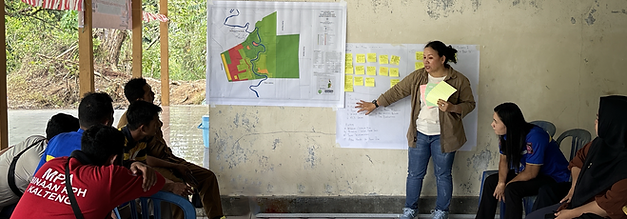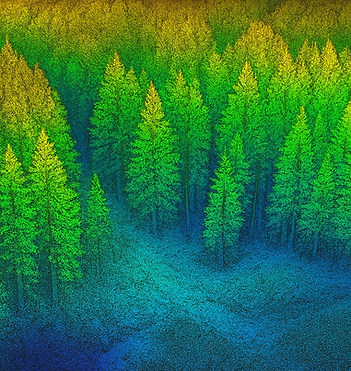
Project Overview
The Pulang Pisau project is a nature-based carbon project focused on conserving and restoring the unique peatland ecosystem of the Central Kalimantan region.
The project will focus on Wetland Restoration & Conservation (WRC) strategies to restore drained or damaged wetlands, preserving their immense carbon storage capacity and safeguarding water systems. In addition, the project will reforest degraded areas with native vegetation to rebuild carbon sinks, aligning with Afforestation, Reforestation, and Revegetation (ARR) strategies.
Combined, these efforts boost carbon sequestration, support biodiversity, and build climate resilience, while creating sustainable benefits for local communities closely tied to the land.
21,000+
Hectare Area Protected
888,000
Ton CO₂ Emission Reduced Annually
60
Native Species Protected (Flora and Fauna)
4,000+
Community Member Empowered


.png)
Early
Investment
Be at the forefront of Indonesia’s carbon market and shape emerging opportunities
Pre-purchase Carbon Credits
Lock-in high-quality and verifiable carbon credits before price rises.
Financing Opportunities
Challenges

Illegal Logging
Unregulated logging still occurs in the area because immense forest area complicates monitoring efforts. This continuous deforestation reduces carbon storage and threatens ecosystem balance.

Forest Fires
Peatlands have become more fire-prone due to land clearing and canalization that dries out water content in the peat soil. Due to its high carbon storage, when the soil parches, peatlands become highly flammable, leading to higher wildfire risks. When peatlands burn, they emit locked carbon into the air, causing various health issues and threatening locals’ livelihood.

Land Conversion
Pulang Pisau peatland has been continuously converted for commercial agriculture and development, weakening carbon sinks and hindering restoration efforts.
Activites
Rewetting, Revegetation, and Revitalization
Hydrological restoration
Restore the natural water balance of peatlands by closing drainage canals and reconstructing bore wells. These efforts help rewet the peat, reduce fire risk, and stabilize the ecosystem’s carbon storage capacity.

Reforestation and revegetation
Replant burned and degraded areas with native tree and plant species to accelerate habitat recovery, enhance biodiversity, and improve water quality across the landscape.

Fire prevention & monitoring
Deploy trained patrol teams and early warning systems to monitor vulnerable zones, helping to prevent wildfires before they start and protect long-term project integrity.

Community engagement & livelihoods
Work closely with local communities through training and upskilling programs, creating alternative livelihood opportunities that reduce dependency on peatland exploitation and foster local stewardship.

All restoration efforts are guided by Indonesia’s Peat Ecosystem Restoration Plan (RREG), ensuring compliance, credibility, and alignment with national climate and conservation goals.
From the Forest, to Your Device
Our technology brings transparent and traceable carbon data from the forest to your device, enabling faster reporting and decision-making.

Satellite Imagery
Tracks large-scale landscape changes and carbon stock trends over time.

Drone Mapping
Captures high-resolution visuals for detailed site assessments and restoration monitoring.

Data Dashboard
Visualizes and integrates all monitoring data for informed decision-making.
A Carbon Sink Frontier
Tropical Peatland: Globally Rare, Locally Vital
Pulang Pisau is rooted in peatland ecosystem. Peatland is a type of wetland formed from waterlogged, decaying plant material over thousands of years. This environment stores massive amounts of carbon beneath the surface. Peatlands play a crucial role in regulating the Earth's climate by locking away carbon over long periods.
Key to Climate Stability and Biodiversity
Tropical peatlands are rare, covering only about 0.3% of the Earth's land surface but storing approximately one-third of the world's soil carbon. Indonesia alone holds about 36% of the world’s tropical peatlands, making forests like Pulang Pisau critically important.
Protecting Our Carbon Sink Frontier
With canalization that parches water contained in peat soils and global warming, in dry season peatland become highly flammable. When fires occur, peatlands release vast amounts of carbon into the atmosphere, much more than typical forest fires. Without proper protection and management, peatlands risk transforming from one of the planet’s most important carbon sinks into one of its largest sources of emissions.
Protecting Pulang Pisau Forest means safeguarding one of the world’s most valuable natural carbon stores and advancing the global fight against climate change.
Protecting Pulang Pisau Forest means safeguarding one of the world’s most valuable natural carbon stores and advancing the global fight against climate change.

Home for a Resilient Community

A Vital Habitat for Wildlife

The orangutan is a great ape native to Borneo. It plays an important role in forest regeneration by spreading seeds. Habitat destruction and illegal wildlife trade are major threats to its survival.
Orang Utan
(Pogmo Pygmaeus)
IUCN Red List Status:
Critically Endangered

The Bornean Gibbon is a primate found in the forest of Borneo. It is arboreal, relying heavily on tree cover, and is highly affected by forest degradation. The species is endangered due to intensive logging, forest fires linked to land clearing, and illegal wildlife trade, all of which are driven by human activity and contribute to the rapid loss of its forest habitat
Owa Kalimantan (Bornean Gibbon)
IUCN Red List Status:
Endangered

The Long-tailed Macaque is a unique primate species in Southeast Asia, including Borneo. It plays an ecological role through seed dispersal but faces threats from urban expansion, deforestation, and conflicts with humans, especially in agricultural and urban areas where they are sometimes seen as pests and are captured or culled
Kera Ekor Panjang (Long-tailed Macaque)
IUCN Red List Status:
Endangered

The Kucing Merah, or Bay Cat, is a small wild cat species found only on the island of Borneo. This elusive feline is rarely seen in the wild due to the conversion of forests into palm oil and timber plantations, as well as logging and infrastructure development that fragments its habitat.
Kucing Merah
(Bay Cat)
IUCN Red List Status:
Endangered
Explore Other Project

CSR Tree Planting

CSR Tree Planting

CSR Tree Planting







